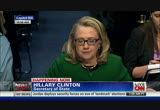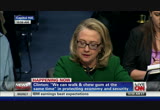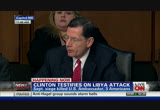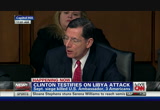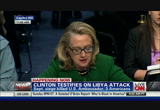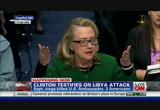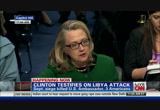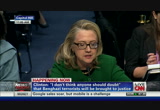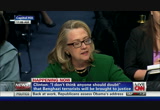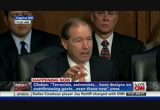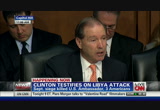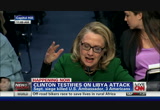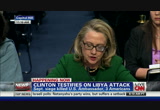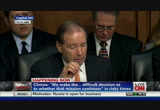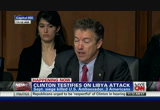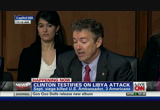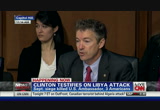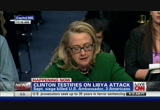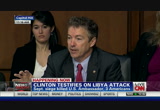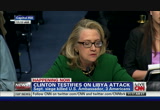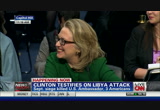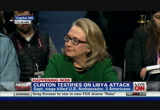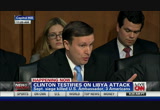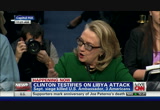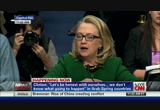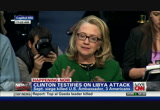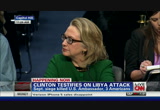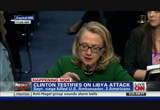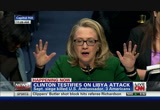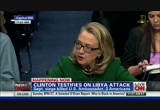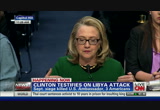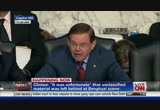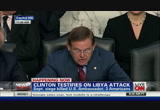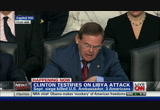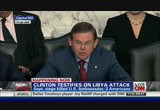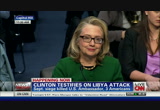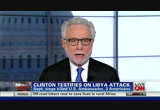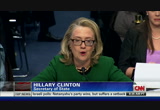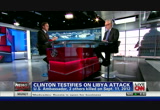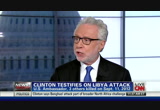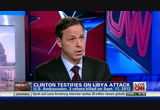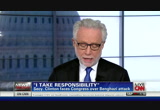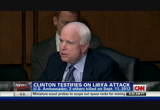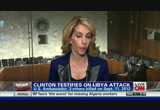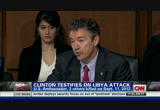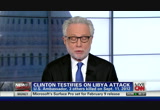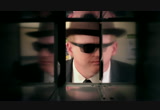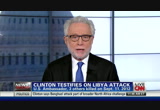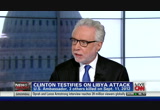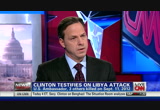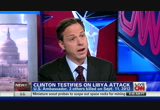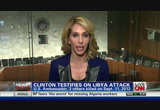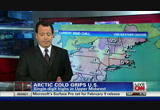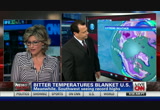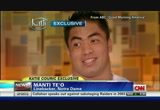tv CNN Newsroom CNN January 23, 2013 8:00am-9:00am PST
8:00 am
senator durbin, and we need the help of this committee. i am one who believes that we have to both walk and chew gum at the same time. we have to deal with our own economy and our fiscal situation. that is a given because that is the source of our strength and capacity but we also have to be smart about making the right investment in diplomacy and development to try to solve problems and prevent them. so, you know, i have outlined what should be a no-brainer. let us have the permission to take money we already have. we're not asking for more money and put it to work where the aa.aa a.r.b. told us to do and then let's move forward. sequestration will be very damaging to the state department and usaid if it comes to pass.
8:01 am
it throws the baby out with the bath. are there programs that we can reduce and make more efficient? yes. that's what i've been trying to do, is push that forward and that's what the qdr process was about. but there are programs first and foremost for the security of our personnel in dangerous places that we can't afford to cut more of and so i hope we get the transfer authority and then have a sensible budget discussion going forward. >> thank you. >> thank you. senator bar ras sew. >> i want to thank you for your incredible commitment to this as well as secretary of state and as a doctor i will tell you i have seen you work yourself to exhaustion, not for your own benefit but for the benefit of the people of this country and the country is grateful for that. i, like you, agree that we need to make sure that something like this never happens again. and i've kind of looked at it like the challenger explosions,
8:02 am
because of o-rings where we didn't see it coming but should have seen it coming. as you said, you never saw the security requests. the concern is that we should have been seeing these sorts of things. there were the attacks on the british ambassador, there were the attacks on the red cross when they pulled out of benghazi. and yet we had no evacuation plan established in spite of the fact that months earlier in libya we had an italian ferry boat to be able to get people who were in danger at the time. those are the concerns. we want to make sure that there is security for our ambassadors, which gets to the issue of -- we talk about what happened on the talk shows and you say the best information was what was best
8:03 am
available at the time. the american people heard, we had a substantial security presence. they heard, we obviously did have a strong security presence. they heard, obviously there was a significant security presence. and i just believe that that wasn't the case. and i would ask you today, if you believe we had a significant, substantial, and strong security presence in libya at that time. because we want that for all of our ambassadors. >> right. well, senator, we had a security present that was mutually reinforced with the annex. we had had, as you rightly point out and others before you, previous incidents, not only against our compound but against the british, the red cross, and others. and what we -- you know, what we
8:04 am
have accepted from the a.r.b. recommendation is that even though there was a back and forth in the cables and discussions, do you need three d.s. agents or five? we had five there but we had an unprecedented attack, as one of the former rsos, regional security officers testified, an attack that truly was not expected even though on that night we had the requisite number of ds agents. we can get mired in the back and forths but i believe we will be doing more to help prevent future tragedies and attacks if we take the a.r.b. recommendations, because after all, they had no stake in this debate one way or the other. they just wanted to look at the facts and then tell all of us what we needed to do and i think that's what our highest
8:05 am
responsibility is. >> thinking about future attacks and trying to prevent those on september 12th, the president vowed to, quote, bring to justice the people who killed in benghazi. we asked the question and senator risch talked about, the people perpetrated the recent attacks in algeria, were they part of it or were they made perhaps em bold dennboldened be one has paid a penalty for the attacks in benghazi? >> i know that the fbi has been briefing some committees. i assume some members of this committee are included. i don't know that but i would assume. about the progress of their investigation. i got the most recent update from the director a few days ago when he returned from north africa. they are following some very promising leads and putting together cases. they would have to speak to you
8:06 am
directly about that in a classified setting. but i think what they are trying to determine is how best to respond and i think what the president clearly said is, we will respond and we will bring those to justice and i don't think anybody should doubt this president at his word. we have some very good examples of that. it may take time but he does not in any way divert attention from the goal of bringing them to justice. >> thank you, madam secretary. the president also said al qaeda has been decimated and in light of the recent terrorist activities that we continue to see in north africa, around the world, would you characterize that as al qaeda has been decimated? >> well, core al qaeda certainly has been. i think would you hear the same from the intelligence committee, or d.o.d., the work that has been done in afghanistan, in the
8:07 am
borders area between afghanistan, pakistan certainly has taken out a whole codry of leadership. what we are seeing now are people who have migrated back to other parts of the world where they came from, primarily, who are, in effect, affiliates. part of the jihadist syndicate, like maghreb uses that name. the fact is, they are terrorists, they are extremists. they have designs on overthrowing existing governments, even these new islamist governments of controlling territory. so although there has been the decimation of core al qaeda in the afghanistan/pakistan region, we do have to contend with the wannabes and affiliates going forward. >> thank you, madam. >> thank you, mr. chairman and thank you, madam secretary for
8:08 am
being here and it's great to see you today. you have been, i think, a real and dedicated public servant for this country and your travels around the world as many here have talked about it, the million miles that you have put on and all the countries you visited and i think you've been to many countries where they've never had a secretary of state and i've seen firsthand when i've been to many of these countries, the difference it makes to have you there on the ground. so i, first of all, just want to thank you for that and i know it does take a toll but you are incredibly dedicated to that. secondly, it's great to see you here in good health. >> thank you. >> smiling and engaging with all of us. and i want to ad to the list, people senators going down the line and talking about some of your accomplishments.
8:09 am
i know previously i talked to you about cook stoves which i know has been one of your initiatives and it's, once again, an example of picking something where people around the world who are living on a dollar or two a day, if you put in a technology, like an up to date cook stove, you can make a big difference on their health, the health of their children, and you can make a big difference on the environment. so i would add that to the list that has been given here today, a very thoughtful policy making on your part. now, one of the findings the board made in its report is that -- and i'm quoting here -- the total ee lilimination of ris a nonstarter given where stability is most profoundly
8:10 am
lacking and sometimes minimal to nonexistent and i'm ending a quote there. and this report really, as you know, madam secretary, underscores the difficulty in finding the right balance between engagement and security. and i fully support, as you've asked here and you've made the point to our committee, the idea that we should reprogram this 1.4 billion, get our act together and respond to the recommendations. but my question here resolves around the high-risk posts. i think the term you've used is having 20 of them. is this how many there are, how many high-risk posts we have around the world? >> well, it's a sliding scale. >> yes. >> there's very high and there's high. it's a constantly evolving threat environment. >> will you give us a range?
8:11 am
very high and -- >> i would like to give you that in a classified document because i don't think it helps us to point out the ones that we think are most at risk and then the ones that would be perhaps in a secondary category but i think it's fair to say, senator, we operated in pakistan, iraq, afghanistan, yemen, we operate in places where we know that our facilities are being surveilled for potential attacks, where we have a steady intel stream of plotting against us. we know that. and we make the decision which is a difficult decision as to whether or not that mission conditions and i have to say we really rely on our security professionals to implement the protocols and the procedures and i have to say they do a tremendous job. the vast majority of the cases i
8:12 am
could give you a long list of attacks averted of assassinations stopped, of the kinds of daily efforts that our diplomatic security professionals are engaged in. so i have a lot of confidence in them but we are going to do what we can to make sure that they get the support within our bureaucracy that they deserve out on the ground in protecting our diplomats. >> and i know i want to obey the time limits here because you need to move over to the house and others want to question. but maybe you could answer this one for the record. does it make sense that in some of these high-risk areas that we consolidate those particular areas with more secure areas and then be able to be in a situation where our personnel would be safer? and i'm not asking to you really answer that now. my time's run out and i want
8:13 am
others to be able to question. >> i will say that one of the recommendations out of the east afri africa a.r.b. was to do that and that was done in the vast majority of cases wherever it's possible to co-locate but we're taking a look at that to see what more we can do. >> senator paul? >> thank you for appearing, secretary clinton, and i'm glad to see your health is improving. one of the things that disappointed me about the original 9/11 was no one was fired. we spent trillion of dollars but there were human errors and those people need to be no longer in charge of making judgment calls. we have a review board. they found 64 things we can change. a lot of them are commonsense but it's a failure of leadership that they were not done in advance and four lives were
8:14 am
caused because of this. i'm glad that you're accepting responsibility. i think ultimately with your leaving you accept responsibility for the worst culpability. had i been president at the time and did not read the cables, i think it's inexcusable. the thing is, we can understand that you're not reading every cable. i can understand that maybe you're not aware of the cable from ambassador in vienna that asked for $100,000 for an electrical charging station. i can understand that you're not aware that your department spent $100 thourk on three comedians who went to india on a promotional but i think you should be aware of the $80 million on a consulate that will never be built. i think it's inexcusable that you did not know about this and did not read these cables. i would think by anybody's
8:15 am
estimation, libya had to be one of the hottest hot spots in the world. not to know of the request securities really i think caused these people their lives and their lives could have been saved had someone been more available, had someone been more aware and on top of their job. i don't suspect you of bad motives. the review board said these people were not willfully negligent. i don't suspect your motives of wanting to serve your country but it was a failure of leadership not to be involved. it was a failure of leadership not to know these things and so i think it is good that you're accepting responsibility because no one else is and this is -- there is a certain amount of culpability to the worst tragedy since 9/11 and i'm glad you're accepting this. now, my question is, is the u.s. involved with any procuring of weapons, transfer of weapons, buying, selling, anyhow transferring weapons to turkey out of libya?
8:16 am
>> to turkey? i will have to take that question for the record. nobody has ever raised that with me. >> it's been in news reports that ships have been leaving from libya and may have weapons and what i'd like to know is the annex that was close by, were they involved in procuring, buying, selling obtaining weapons and were any of these weapons being transferred to other countries, turkey included? >> senator, you'll have to direct that question to the agency that ran the annex. and i will see what information is available and -- >> you're saying you don't know? >> i do not know. i don't have any information on that. and with respect to personnel, senator, first, that's why we have independent people who review the situation as we did with the pickering and mullen a.r.b. and all four individuals identified in the a.r.b. have
8:17 am
been removed from their job. secondly, they have been placed on administrative leave to determine the next steps. third, they specifically highlighted the reason why this is complicated because under federal statute and regulations, unsatisfactory leadership is not grounds for finding a breach of duty. the a.r.b. did not find these four individuals breached their duty. so i have submitted legislation to this committee, to the congress to fix this problem so future a.r.b.s will not face this situation. >> but here's the problem. the review board has all these recommendations but there's one thing they failed to address and you failed to address and sets out another tragedy like this, they should never have been sent in there without a military guard. this should have been an embassy like in baghdad in a war zone and should have been under significant military guard. i don't think the state department is capable of being in the war zone protecting these
8:18 am
people. i still don't think that. i think another tragedy could happen. i think another tragedy could happen in another war zone around the world. someone needs to make an executive decision and take leadership and should be that you shouldn't send them in with no marines, marines there to guard records, not people. you shouldn't send them in with the same kind of ambassador or embassy staff that you have in paris. i think that's inexcusable. >> well, senator, the reason i'm here is to answer the questions the best i can. i am the secretary of state and the a.r.b. made very clear that the level of responsibility for the failures that they outlined was said at the assistant secretary level and below. the administration has sent officials to the hill more than 30 times. we've given as much information, we've been as transparent as we can. obviously we will continue to brief you and others to answer
8:19 am
any and all questions that you have about going forward. the reason we put into effect an accountability review board is to take it out of the heat of politics and partisanship and accusations and to put it in the hands of people who have no stake in the outcome. the reason i said make it open, tell the world is because i believe in transparency. i believe in taking responsibility and i have done so and i hope that we are going to be able to see a good working relationship between the state department and the committee going forward. >> thank you. senator murphy? >> thank you very much, mr. chairman. secretary clinton, i approached this hearing with some degree of sadness. it's my first and your last. but i am so appreciative of your service. you've done such credit to this nation. and we will be sorry to see you
8:20 am
go. we know that you will continue to give us good counsel and advice in the coming years. i think if some people on this committee want to call the tragedy in benghazi the worst since 9/11, it misunderstands the nature of 4,000 americans plus loft over ten years of war in iraq fought over false pretenses. it was fought under false pretenses but also fought i think because we had a misunderstanding of what we could do and manage in that region, what was under our control. and i guess my question to you, secretary clinton, is about what our expectations are going forward in north africa. and i think you've referenced this in your opening remarks about what is under our control. one of our criticisms in the review board was that we didn't
8:21 am
have a full understanding of this complicated set of allegiances between jihadist groups shifting on an almost daily basis and i worry when we do this retro sprek tif handling over a situation like this we give the impression of american people that we can know all, control all, and see all in a region that we certainly are just beginning to stand up the kind of presence that we ultimately may need and want. so i guess i present this as that open-ended question to you. as we move forward and especially for new members of this committee who are probably going to be spending a lot more time on africa and north africa than this committee has ever spent before, what are the expectations that we should set for the american public as to what we can control, we can know, and potentially the changes on the diplomatic side we need to make in order to have a more solid footprint in relation with neighbors there who may be willing to help us
8:22 am
when it comes to intelligence and intervention with this very complicated landscape of jihadist groups. >> well, senator, that's a great question and raises the heart of the challenge we face. we are in a new reality. we are trying to make sense of changes that nobody had predicted but which we're going to have to live with. i can't do justice in the time i have left here to the really important issues that you have highlighted but i think, first and foremost, let's be honest. let's be honest with ourselves. let's avoid turning everything into a political football. let's instead try to just say, look, this is unprecedented. we don't know what's going to happen in this new revolutionary
8:23 am
environment across north africa and the middle east but let's see what lessons we can learn from what worked in the past, see what is applicable and bring people together who will have the open discussion that used to be the hallmark of this committee and of the senate. i mean, people used to have hearings where it wasn't just having the administration officials come up and ask the questions and go on from there but really to delve into what works and what doesn't work, bring in outside experts. let them debate in front of you and try to figure out what the best information going forward is. over the last weeks i've pulled writings from, you know, what you would call very conservative and very lab briberal commentat about what you should be doing in this region. we have to approach it with humility but we have some real
8:24 am
assets if we deploy them right and helping to rebuild security is essential. we did it in colombia. we did it in somalia and there are he examples across the world. let's be smart and learn from what we have done in the past and see what can be transferred into the present and the future and let's be honest in trying to assess it to the best of our abilities and i think with the new chairman and ranking member, from my conversations with both of them, i think this committee could play such an essential role in trying to answer your questions and put forth a policy that wouldn't go lurching from administration to administration but would be a steady one like we did with colombia and the cold war. let's be smart about this. we have more assets than anybody in the world but i think we've gotten a little bit off track in trying to figure out how best to
8:25 am
utilize them. >> i also regret that our overlap will be so brief. i think the country is at our strongest when we balance it with economic strength and strength of our moral example and i can't think of a person that exemplifies that balance in a public service career as well as you do and i appreciate that. >> thank you, senator. >> a few questions -- sort of detailed questions that trouble me. in the unclassified version of the a.r.b., there's a comment a. brief one. in december 2011, the undersecretary for management approved a one-year continuation of the u.s. special mission in benghazi which was never a consulate and never formally notified to the libyan government. why wasn't this special mission notified to the libyan government? is that a common practice? did the lack of notification
8:26 am
have any connection with the weak libyan governmental response on the 11th? and there are any changes in connection with the a.r.b.'s recommendation to the idea of special missions that are not notified formally to the host government. >> thank you and welcome to this committee. the united states notified to the libyan government the specific names of people who were serving in libya in both tripoli and benghazi. that in no way affected the legal obligation in libya under the vienna convention. the problem, as i said, was not their willingness. it was their capacity. and as you know, from the first time chris stevens arrived before the fall of gadhafi, he relied not on any libyan governmental committee but on the february 17th brigade and
8:27 am
then we supplemented that after gadhafi's fall with ds agents and private security agents. so there was no effect on anything from the libyan government that was related to that. however, we do think that needs to be looked at going forward. the a.r.b. made a very important point, that the so-called temporary nature of the mission did prove to be confusing to people down the chain responsible for reading those cables. we get about, i don't know, how many millions of cables do we get? and i have to confess i do not read all of the cables that come into the state department. that's why we have huge workforce for people who are given responsibility and look forward to carrying that responsibility and i think designating it as temporary in the a.r.b.'s findings did cause an extra level of uncertainty to some extent.
8:28 am
as the chairman said at the beginning, quoting from the a.r.b., there has been a culturation to husband resources, to be as careful in spending resources as possible and then i think adding to that the fact that it was, quote, temporary probably did lead to some of the confusion that we later saw played out in the cables. but not the status of it for the libyan government. >> how common is it for us to rely on local nongovernmental security as was the case with the blue mountain in february 17 brigades in benghazi? >> it's very common. we employ privately employ security guards in a very high number of our posts in the world. if we go to the embassy in baghdad or in kabul or many of
8:29 am
our high-threat places, you will see private security guards. now, because of problems with security guard contracts that came to light in iraq, whereas you remember, there are a lot of difficulties. there were security guards protecting other civilians. many countries have put very stringent requirements on private security guards and in fact libya, the transitional government prohibited security guards which was why there was this -- unless they approved them. so they approved this blue mountain company that was a joint libyan/british organization. as i said, historically marine guards do not protect personnel. their job is to take care of classified material and destroy it. we had no classified material in
8:30 am
benghazi. it was unfortunate that we evacuated all of the americans and unclassified material was left behind but we had no classified material. so there's going to be an effort, because of this work that i have directed, to really sort this out so that you know, that everybody knows exactly what the protocols and the rules are and we act accordingly. >> thank you, madam secretary. mr. chair? >> madam secretary, thank you for your thorough, thoughtful, and forthright answers. it's what we've become accustomed to from you. i understand we're going to be able to welcome you one more time when you come tomorrow to be part of introducing senator kerry to the committee. we look forward to talking to you then as well. i think there are several takeaways here that are incredibly important. one is that we have to look at the totality of the threat environment versus just looking
8:31 am
for a specific credible threat when we are thinking about the protection of our foreign service personnel and we are moving in that direct. the other thing is that the government has clear lines of authorities and responsibility for security matters instead of silos looking more in a horizontal nature and i understand that that is under way. a lot has been said about resources here. secretary gates used to famously argue that there are more people in military bands than in the entire military force. it seems to me we can protect our diplomats who serve on the front lines and i am concerned when the a.r.b. says that the state department has been engaged for years and a struggle to obtain the resources necessary to carry out its work and that has conditioned the thinking of some in the state department that it is imperative
8:32 am
for the state department to be mission-driven rather than resource constrained, particularly increasing parts of the world. so i look forward to immediately working with a ranking member in reaching out for chairman royce to get that transfer authority within the existing budget. it's not about additional money, it's about taking money that's already been appropriated so you have the ability to start working and the next secretary has the ability to start working to protect our people as robustly as we can. and failure to do so, i think, is going to be a poor judgment on this congress that we can't get you, at minimum, that transfer authority. and finally, i know a lot has been made about the question of what was said and what was not said and i simply think about that in the context that there are lessons to be learned there as well. in our drive to produce
8:33 am
information about the incident we want to be able to get information as quickly as possible as we should. but i think what we know and what we don't know is equally as important. and maybe the admonition that we should know before we speak is incredibly important. that would have been incredibly important when we were told that there were weapons of mass destruction in iraq and as someone who voted against the war in the house and basically that there was such information, i look -- when we talk about tragedies and certainly benghazi was a tragedy -- when we lost 4,486 american lives in iraq and thousands who have been injured and changed their lives forever and increase the influence of iran, i think, from my own personal perspective, that was truly a tragedy. and so there are lessons to be learned here. there will be questions for the
8:34 am
committee to ask for the close of business tomorrow since we don't expect you to be too much longer in your position and we thank you for your service and appearance and senator corker, a final word? >> i would actually add three more takeaways, not only conversations here today but over the last few days. the issues at the state department and white house deal with on a constant basis, i think this committee will be useful and can be useful in setting a long-term exploration of what our national interest is so we look at this over a longer term con tetext. we talked about the full authorization that actually would be very helpful to people like you, come in for a very short period of time, for us to help set those priorities. that would be something you would embrace and something this committee has never done since i've been here. and thirdly, that we live in a
8:35 am
world now where we know that al qaeda is going to be a threat in north africa for years to come and we need to have policies that realize that and address it. i, too, thank you for your service. i know not a lot of nia lot of things will be said tomorrow but i thank you. >> on that, this committee is adjourned. >> so there you have it. they were supposed to spend 90 minutes. they spent 2 1/2 hours testifying before the senate foreign committee. i'm wolf blitzer. you're watching cnn's special live coverage surrounding secretary of state's hillary clinton's testimony on capitol hill. it was a sometimes very emotional, sometimes very fiery appearance regarding the deadly attack on the united states diplomatic compound in benghazi, libya. first of all, listen to this. >> with all due respect, we have
8:36 am
four dead americans. was it because of a protest or guys out one night decided to kill americans. what difference at this point does it make? it is our job to figure out what happened and do everything we can to prevent it from ever happening again, senator. >> that was the secretary of state responding to ron johnson of wisconsin getting very, very fiery in rebutting his accusations but listen to this, for a very different side of the secretary of state. >> for me, this is not just a matter of policy. it's personal. i stood next to president obama as the marines carried those flag-draped caskets off the plane at andrews. i put my arms around the mothers and fathers, the sisters and brothers, the sons and daughters and the wives left alone to raise their children. it has been one of the great honors of my life to lead the
8:37 am
men and women of the state department and usaid. >> she really gets emotional. she's choking maback tears. jake tapper has been watching this with me. dana bash is on capitol hill. this is vintage hillary clinton. she responded to the direct accusations, the challenges but the republicans especially -- and we'll get to this shortly -- john mccain and rand paul were tough on her. they were not backing down. >> that's right. republicans were focused on, one, the administration specifically the united nations ambassador susan rice initially in the sunday show appearances, on all five sunday shows that sunday but also an initial discussion about what happened in benghazi, the word was that this was not a terrorist attack, this was a spontaneous protest because of the anti-islam video which of course turns out not to have been the case and a lot
8:38 am
senators were focused on why were these talking points false. johnson said dr. rice was purposefully misleading the american public. dr. rice said she was not, she was using the talking points used by the intelligence committee and no effort to mislead. she was providing as much information as she knew at the time. the other information by senator rand paul talking about the lack of accountability, how come nobody was fired. he said if he had been presented at time, and this is somebody who harbors ambitions, he would have relieved secretary clinton of her jobs, specifically for not having read all of these cables from on the ground in libya, diplomatic personnel requesting more security in the month leading up to the attack. >> she acknowledged an earlier question, she had not been fully briefed on the diplomatic security administration in benghazi, libya. i want to play a clip for you
8:39 am
and bring dana in where she gets emotional a second time. listen to this. >> the two hardest calls that i made were obviously to the families of ambassador stevens and sean smith and, you know, i have to say, they were extraordinary in their responses and their understanding offed it pride we had in both men and gratitude we had for their service. >> were you surprised she got as emotional in discussing the death of ambassador chris stevens and the others? >> no, because she has been reaching out directly to these individuals and, of course, these were people who were killed on her watch at the state department. she went through a list early in her testimony of all the individuals who had been killed at diplomatic compounds and you
8:40 am
have to remember, of course, unlike soldiers who there is inherently a risk of the threat of life or death, a lot of diplomatic people, we don't perceive them as putting their lives at risk. oh, they work for the state department, their job is not as dangerous. and it's not true. and people like secretary clinton have now learned that firsthand. she, of course, knew that because of her time working with her husband in bill clinton's administration, all of those diplomatic people, personnel people killed in kenya. but from sources close to her, this really did take a very, very strong emotional toll on her and in addition to an exhausting job, i think it probably is part and parcel of the exhaustion that we've seen that she's been suffering from. >> let's go to dana up on capitol hill. the exchange she had with john mccain, john mccain praised her at the beginning but then point
8:41 am
by point by point he went after her specifically. he didn't mince any words. this was a dramatic moment. >> reporter: that's right. the two of them have a long-standing relationship. they were pretty close when they served together in the senate and traveled together internationally but john mccain has been the leader of this crusade of benghazi to get to the bottom of why many, many things went wrong. listen to the way he put it and listen to her reaction. >> i categorically reject your answer to senator johnson. why is it that the administration still refuses to provide the full text of e-mails regarding the dell lesion of al qaeda in the talking points? why do we care? the classified information had been included, it gives an entirely different version of event to the american people. going to the american people and tell them what happened, then you ought to have your facts
8:42 am
straight. >> well, senator, i understand your very strong feelings. you knew chris, you were a friend of chris, you were one of the staunch of supporters in the efforts to dislaunch gadhafi and give the american people a chance and we just have a disagreement. we have a disagreement about what did happen and when it happened with respect to explaining the sequence of events. >> reporter: you saw that both of them were very pointed and very respectful. you could see their underlying relationship there. one thing i want to point out, as jake was talking about, these talking points we heard about them atted a flaws yes, ma'am because republicans say that they believe that this is case in point of from the perspective of some of them, that this was -- that there was a coverup inside the administration. john mccain has said that time and time again, a cover up going
8:43 am
up to the highest level. that's why they are continuing to harp on that. one of the things that has been going on over the past 2 1/2 hours behind me is a very important political subplot, that is 2016, hillary clinton is being talked about big time in the democratic side, two republican senators, marco rubio and rand paul also talking about it. i've talked to rand paul myself. he has not denied that he's not thinking about it. listen to the way he addressed hillary clinton. >> i think you accept the culpability for the worst tragedy since 9/11 and i really mean that. had i been president at the time and i found that you did not read the cables from benghazi, you did not read the cables from ambassador stevens, i would have relieved you of your post. i think it's inexcusable. >> reporter: so you saw there, pretty pointed against hillary clinton, also saying that it's a
8:44 am
failure of leadership. trying to sort of give her a backhanded compliment, appreciating her taking responsibility but clearly laying the blame at her feet himself. she made clear, she didn't really actually answer his question. it was clear she sort of -- the look on her face told it all. but she said, i'm secretary of state. we have thousands of people working in our building. it's their job to read the cables and that really was one of the underlying discussions here that she talked about with democrats and republicans, that, you know, she did have a lot of discussions about security, broad discussions but on this particular issue, security at this consulate, she said she was not made aware of the specific requests from chris stevens. >> yeah, she did indeed. dana bash, stand by, jake tand by. we're going to continue our analysis of what happened, dramatic 2 1/2 hours. much more of our special coverage here in the cnn "newsroom" right after this.
8:45 am
8:47 am
8:48 am
the u.s. ambassador to libya were killed on the 11th anniversary of 9/11, last september 11th. she came before the committee. she was supposed to testify for 90 minutes. she spent 2 1/2 hours answering questions in her testimony. jake tapper is here. dana bash is up on capitol hill. remember the context, it was happening in the midst of the tail end of the campaign and republicans keep making accusations against the obama administration, they tried to paint a positive picture of the decimation of al qaeda for political reasons rather than sharing the specific information that they had. on one of those five sunday talk shows you were filling in and you had susan rice appear before your show. do you remember how she responded? this was five days after the attack in benghazi. >> well, first of all, i remember we were all requesting
8:49 am
secretary of state hillary clinton because it was under her purview just in terms of booking but that's not who the white house put out. the white house controls they. they control this process of sunday shows and guests with an iron hand. >> were you surprised when susan rice was the designee? >> yes, because as president obama said later, she really had nothing to do with security decisions in benghazi or libya at large. she's the ambassador to the united nations. i didn't know what she was doing there other than that she was a high level and came armed at that point that this was not the result of a spontaneous protest because of the muslim video, it was too well coordinated. >> it was a planned attack, a terrorist attack and that was obvious as senator mccain says in the classified information that they had but they deleted
8:50 am
the al qaeda specific reference in the public talking points that she was given. >> that's right. and the question is, was it deleted so that the intelligence officials would -- because they were worried about warning the bad guys, the terrorists in that region of africa that they knew who they were. or was it for a political reason that the obama administration had this talking point that al qaeda was being decimated and it was two months before the election and didn't want to ruin that talking point. those in the white house obviously say it was purely for intelligence reasons they were not confident enough in the intelligence at that point to say to a certainty that without question it was a terrorist attack by such and such group, and in addition they did not want to let any of the bad dguy that they were wise to them. >> dana, i was surprised how
8:51 am
tough senator mccain and rand paul was. neither one minced any words in going eafr tafter the secretary state. i suspect that's going to be a prelude before she testifies this afternoon. there are republicans on real t questions for her as well. >> there certainly are. in a way i actually am not that surprised. i know you've seen john mccain get even more aggressive with the person on e other side of the deus sitting in the witness chair. ran paul likely has aspirations for higher office but, yes, absolutely. that always tends to be kind of the atmosphere here on capitol hill. the house, they're kind of more rabl rousers for lack of a better way to say it. i was told today by a member of the house foreign affairs committee that the republican chairman said to republican members in a meeting, please be respectful. you know, for the most part even
8:52 am
at this hearing they were tough questions but they were respectful. in the house, i think there is a genuine respect for her, republicans and democrats. there are a number of new members that the leadership are worried will try to make a name for themselves and will give soliloquies and will not look for a specific answer. it will be a very interesting dynamic over there. >> that's at 2:00 p.m. eastern, right? >> correct. that's supposed to be 90 minutes as well. as you mentioned, this went a whole lot longer. perhaps because hillary clinton decided to give plenty long, lengthy answers. >> we'll see how long that goes. there are a lot more members in the house sforeign affairs committee. we'll be back at 4:00 eastern. complete wrap in "the situation room." our special coverage will continue right after this break.
8:55 am
welcome back, everyone. this is newsroom. i'm ashleigh banfield. picking up where wolf blitzer left off on the benghazi hearings on capitol hill. there's another big story playing out. i don't have to tell you that it's really cold. it is so, so cold in so many states. and there are images that will tell you that. it's hard to show cold until you
8:56 am
see someone like this throwing a cup of hot water. that's not a joke. that's what happened to the cup of hot water when r when it's around 30 below zero. reporters in north dakota demonstrating. yeah, that's what it feels like, folks. here's what a t-shirt looks like when it's wet on a hanger. >> it sounds like a drum, that's how cold it is. get the nail there. >> that's a banana. that's a banana. so, look, yes, you can't see cold unless you do these fun stunts, but meteorologist chad myers joining us now to talk about, i love stunts and i love it when they can show just how cold it is. the truth of the matter is, while that's fun to watch, this is deadly and it's dangerous. >> it is, especially for all those folks who have to work outside. the ramp workers, firemen, policemen working outside directing traffic. you have to think about this and you have to take breaks out there. it is cold everywhere from new
8:57 am
england all the way back even into north dakota. grand forks, north dakota right now, it is 5 below zero when you look at the thermometer. it feels like 29 below to your skin. feels like 7 below in albany, 1 below in scranton. you say, there you go, guys. all this cold air coming in here, what just happened to global warming? let me just give you an idea what happened to global warming. this is actually caused by the fact that there is no ice up here in the north pole. the stratosphere has warmed up. the jet stream has dipped on down because of that and so this cold front, this cold air is directly responsible for the lack -- from the lack of the sea ice that we have from the north. get to that in the next hour. >> chad, that makes perfect sense because all those dipsy dos used to hit me in winnipeg, canada as i was growing up. now here we are in the united states. i know you're going to continue covering this for us. >> i have another big story, the gripping tale of a rising
8:58 am
football star and it's made its rounds on tv and it's sailing into a brand new chapter this morning. two words describe what's in store for manti te'o, katie couric. she scored the big interview with the note ter dame linebacker. in the first teaser bytes to be released he's admitting that he lied about the girl. but, this is a big but,'s saying only briefly he lied only briefly after he learned that she didn't exist. remember, te'o said he was duped into believing his ontlien girlfriend was real, a girl he never met, a girl who died of cancer? abc's good morning america aired this this morning. >> this girl who i committed myself to died on september 12th. now i get a phone call on september 6th saying that she's alive and that i'm going to be put on tv two days later and they asked me the same questions. what would you do? >> what would you do, l.z.
8:59 am
granderson? we only have a minute left. i want you just to give me your take on that very short bite which katie will air tomorrow? what does this tell anybody, anything? >> it tells people we won't ever know the real truth. there's no way you can tell me this person went through this whole three-year ordeal and that he didn't find out until december. it just doesn't add up. when you look at all the interviews that happened prior to the katie couric interview, it just doesn't make any sense to me. >> it doesn't make senses, but does it as swaj some of his critics? is he going to get a break with what he said? >> you know, the jokes will never go away at this point. all he can do is try to get drafted by the zblifl will that be affected? >> i don't think so. as long as he's physically able to perform at a high level, i don't think his draft status is going to be hurt at all, but if he doesn't perform well in the nfl, then you will continue to hear about the girlfriend that wasn't there joke.
264 Views
IN COLLECTIONS
CNN (San Francisco) Television Archive
Television Archive  Television Archive News Search Service
Television Archive News Search Service  The Chin Grimes TV News Archive
The Chin Grimes TV News Archive 
Uploaded by TV Archive on

 Live Music Archive
Live Music Archive Librivox Free Audio
Librivox Free Audio Metropolitan Museum
Metropolitan Museum Cleveland Museum of Art
Cleveland Museum of Art Internet Arcade
Internet Arcade Console Living Room
Console Living Room Books to Borrow
Books to Borrow Open Library
Open Library TV News
TV News Understanding 9/11
Understanding 9/11